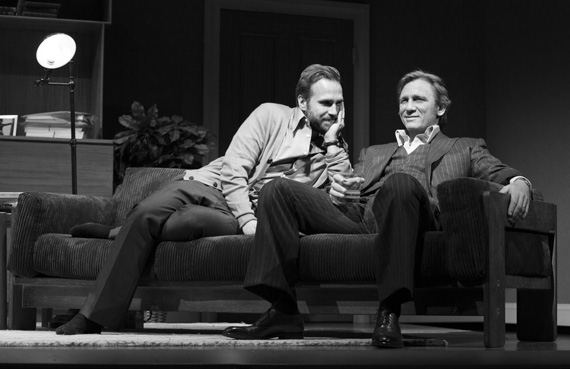Betrayal

(© Brigitte Lacombe)
I was shocked by this play, absolutely shocked! Never in my wildest dreams did I imagine that English people had such feelings…at least not the English people conceived by Harold Pinter in his 1978 play, Betrayal, which has returned to Broadway a second time (debut: 1980; first revival: 2000) in a new production from Tony- and Academy Award-winning director Mike Nichols (Death of a Salesman) at the Ethel Barrymore Theatre. Of course, everyone has feelings, but the stolid prose of Betrayal does not naturally translate into the wild and furious avalanche of emotions unleashed in this uncommon and fascinating revival. As a piece of drama it works quite well, but I left wondering if this is truly what the playwright intended.
Loosely based on Pinter’s own seven-year affair with BBC reporter Joan Bakewell, Betrayal is the story of Robert (Daniel Craig), his wife, Emma (played by Craig’s real-life wife Rachel Weisz), and her lover, Jerry (Rafe Spall), who also happens to be Robert’s best friend and business associate (these randy Brits work in book publishing, natch). Everyone knows that Emma and Jerry are doing it, but does everyone know that everyone knows? More importantly, does it matter? Will they do anything about it? The scenes unfold in reverse chronological order, peeling back the onion of adultery to its core. It’s a tale of the creative bourgeoisie behaving badly, teeming with passive-aggression; or in the case of this production, just aggression.
Pinter’s play includes such husband-and-wife non-confrontations as:
Robert: Where does it…take place? Must be a bit awkward. I mean, we’ve got two kids, he’s got two kids, not to mention a wife…
Emma: We have a flat.
Robert: Ah. I see. (pause) Nice? (pause) A flat. It’s quite well established then, your…uh…affair?
Emma: Yes.
In the 1983 film, Ben Kingsley and Patricia Hodge deliver this scene with icy intensity. Yes, there is dramatic tension, but it always remains carefully contained, suppressed under the legendary British stiff upper lip. Nichols was originally tapped to direct this film, but he withdrew, leaving it to David Jones. If this stage production is any indication, Nichols’ film would have been quite different in tone.
With her trademark plummy rasp, Weisz seems to be barely holding back tears through much of the show. Craig exudes an animal magnetism that often explodes into shouting and Scotch-swilling: It’s Tennessee Williams does London. He bites into his words (I could listen to him say “lunch” all day) with the voracity of a ravenous hobo eating an apple. His sexualized brutality toward his wife is creepy and repulsive. This contrasts sharply with the giddy and playful chemistry between Weisz and Spall, laid bare in their secret love nest on Kinsale Drive. Spall is utterly charming, if a bit gawky.
Robert is only officially aware of his wife’s infidelity with his best friend after 1973 (it began in 1968), but it’s pretty obvious that he knows all about it, deep down, the whole time. The level of self-delusion (or at least feigned ignorance) that one must maintain to play Robert is breathtaking. (Pinter confided to his second wife, Lady Antonia Fraser, that Robert was the best part in the play.) Craig’s barely contained rage fits the bill in a fresh and interesting way, telling the story of an emotionally aware man who must nevertheless keep it all bottled in. This is true of everyone on stage, even the poor waiter (Stephen DeRosa) who suffers Robert’s abuses during a lunch date with Jerry. He is the whipping boy for Jerry’s sins, but he suffers in silence: He still wants to be tipped.
The words of this play fail to convey the depth of the characters’ pain, but their human reactions never do. This is perhaps the greatest betrayal in the play and it makes for a deeply unsettling contrast. Nichols crafts these scenes with the dexterity of a highly imaginative painter, blending fact and fiction, past and present, into a sprawling dreamlike landscape. Ann Roth’s posh retro-’70s costumes (not to mention that hair) wouldn’t look out of place on the streets of modern-day London or New York, provided they were worn with the slightest hint of irony.
Ian MacNeil’s feather-light walls float in and out, while spare sketches of rooms (that usually contain a sagging bookshelf) travel on and off stage on a conveyor belt. James Murphy’s melancholic piano-and-string music accompanies these transitions, suggesting hazily recalled memories in which emotions have left a much deeper impression than physical or sensory details.
The play ends with the earliest of these memories: Robert and Jerry erotically wrestle around on the bed as a posh literary soiree goes on in the other room. (In a recent NPR interview Craig revealed, “[Pinter] said there’s no homosexual overtones at all in the play, but obviously we’re throwing loads in. Just to let you know.”) Emma, high as a kite, looks on and giggles. Then, suddenly, Craig flees the room, leaving Weisz and Spall the uncomfortable twosome in an affair that will last the better part of the following decade.
Moral of the story: These people really should have just had a drunken three-way that first night and been done with it. They probably would have ended up a lot less resentful all those years later. Hindsight is 20/20.










